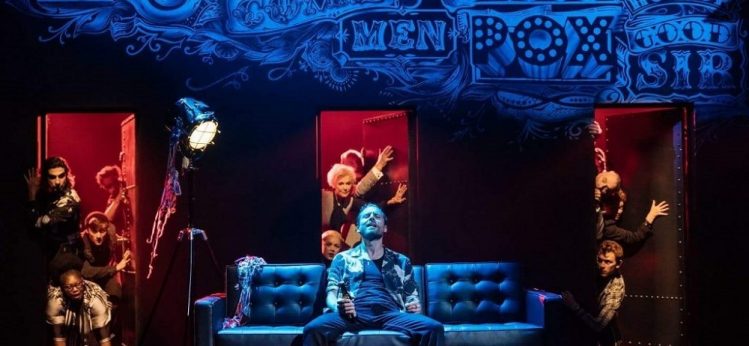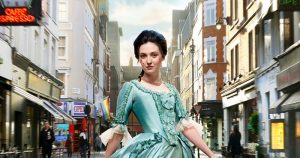


L6th IB drama pupils visit Chichester Festival Theatre to see ‘The Country Wife’.

A spectacular version of the play The Country Wife was performed on Tuesday 19th June by the Chichester theatre company at the Minerva theatre, Chichester. The play, originally written in the seventeenth century by William Wycherly, was directed by Jonathan Munby with the main characters being played by Susannah Fielding, Lex Shrapnel and John Hodgkinson.
After 40 years of censorship and theatre closures by the puritans, the restoration of James II in 1685 sparked an explosion of riotous and licentious performances, exploring aspects of sexual behaviour between men and women. James II had been in exile at the court of his cousin, Louis XIV where he had witnessed the lavish and liberated court theatre of the time. On his return to England, he was determined to sponsor and establish such performances at home.
‘The Country Wife’ is set in the City of London in the seventeenth century. This production, however was adapted to the modern day in terms of costume and staging. Harry Horner (Lex Shrapnel) wants to seduce as many women as possible, but to do so he needs to convince their husbands that he is physically incapable of any such thing. Cannily, his pretended impotence also allows him to sniff out and unmask those respectably virtuous ladies who secretly hate their husbands and ache for him. However, this virile villain hasn’t reckoned with Mr. Pinchwife’s (John Hodgkinson) young and innocent wife Margery (Susannah Fielding) who lives in the rather too plain-speaking countryside and aches to get out of her home and see the so called ‘player men’ in London.
The play focuses on sexual comedy but also has some darkness in terms of women being dominated by husbands as represented by Mr. Pinchwife, physically threatening Margery several times throughout the play when forcing her to write a letter to Master Horner in order to keep him away from his wife.
The costumes of the cast are simple monotone clothes giving the play a contrast between the old original language and its contemporary design of a home set against a black revolving background that allows the cast to change the scenes as a part of the play with loud rock music, the background changing with neon lights and the characters dancing whilst carrying away the props which were placed on wheels. Soho came in for some critical parallel as a place as licentious as 17th century London.
The beginning of the play and the ending of the play were represented in the same way as in both scenes Harry Horner was laying on his sofa in his apartment that was still messy and full of alcohol and cigarettes from the party night before. He wakes up and grabs a half empty bottle of Vodka from the floor, cheers to the audience and drinks some of it. Loud music is played and the doors integrated in the revolving background are being opened with the character’s hands holding onto the wall. This repetition of that scene represents the cycle of the ongoing party in Horner’s life and how he is not serious with women which is also underlined by the loud rock music playing.
In several moments in the play a character was talking in a monologue to the audience whilst the rest of the characters were in a frozen picture in cold blue light. This made the messages of the characters very clear and gave the audience a closer look into the character’s thoughts whilst the other characters were not able to know what is going on in the character’s mind.
The main character Margery is dressed in yellow clothes throughout the whole play which represents her innocence as she is very young and does not interact with the town men such as Horner and therefore is not unfaithful to her husband until she meets him. This also creates a strong contrast between Alithea (Jo Herbert) and Margery as Alithea is dressed in dark colours with dark hair throughout the whole play. Even on her wedding day she is dressing in a dark dress stating that she is not innocent as she associates with the town men. This is also a foreshadowing for her marriage with Sparkish going badly and not lasting very long because she gets engaged to Harcourt (Ashley Zhangazha) only a day after.
To the end of the play Margery also wears Alithea’s clothes when going to Master Horner’s apartment and cheating on her husband. This could mean that the change in style and outfit from yellow clothes to the black clothes indicate a change in personality from an innocent Country Wife to a town woman who’s associated with the player men.
Overall, it was a great new interpretation of the original The Country Wife by using the original language but translating costume and set to a suggestive ‘Cool Britannia’ 1990s. Even though the play was very long, the plot was easy to follow and especially the monologues gave the audience a clear understanding of action and theme. The play had many amusing jokes but still managed to communicate serious moral messages to the audience.
Johanna Blumenberg, L6th pupil